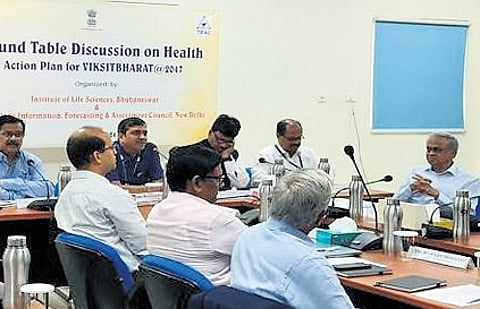

BHUBANESWAR: As the country prepares the action plan for Viksit Bharat in 2047, precision medicine and use of artificial intelligence (AI) in diagnosis and treatment can revolutionise the healthcare sector, said scientists and healthcare experts at a national round table here on Wednesday.
The experts emphasised on point-of-care diagnosis and treatment so that the remotest parts of the country can access advanced diagnostics and have access to doctors from specialised fields. The round table was organised by Institute of Life Sciences (ILS) and Technology Information, Forecasting and Assessment Council (TIFAC), New Delhi as a precursor to the action plan being prepared at the national level.
Executive director of TIFAC Dr Pradeep Srivastava said India used to be the pharmacy of the world once. But now, the Indian pharma industry is heavily dependent on imports for active pharmaceutical ingredients (API), key starting materials (KSMs) and basic chemicals.
“We are preparing a roadmap to ensure that all key materials are developed in the country itself and make India self-sufficient in pharmaceuticals in next two decades,” he said and stressed on the use of technology, which can be used to meet the challenges faced by the healthcare sector due to shortage of doctors and diagnostics infrastructure.
“India has one doctor for a population of 10,000 against the WHO mandate of one for 1,000. Information technology is a facilitator technology. Be it artificial intelligence, machine learning, block chain or sensors, we need to use the technology to overcome shortage of health professionals. AI can be used instead of doctors for preliminary screening while sensors can be used for field assessments,” he said.
Highlighting the importance of precision medicine for better outcome, director of ILS Dr Debasis Dash said this is an emerging field that focuses on tailoring healthcare to individual patients on the basis of their genetic, environmental and lifestyle factors. “For example, the genome profile of a cancer patient might influence the treatment outcome. So, understanding the genetic makeup of patients will help doctors design better therapeutic strategies leading to faster recovery rate,” he said.
Experts also discussed the ways to navigate from the climatic impact on spread of vector-borne diseases like malaria, dengue, Lyme and Zika virus to keep people healthy and leverage health tourism for the growth of the economy. Senior scientist Rajeeb Swain coordinated the event.